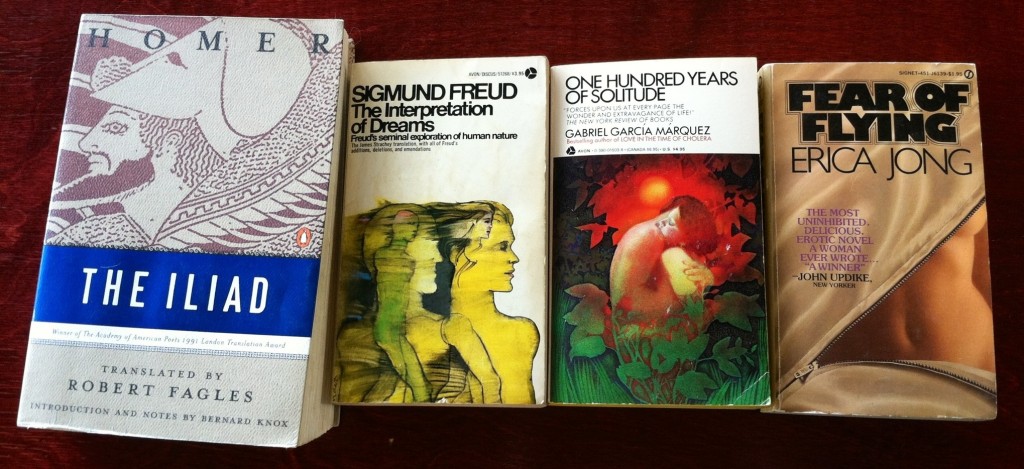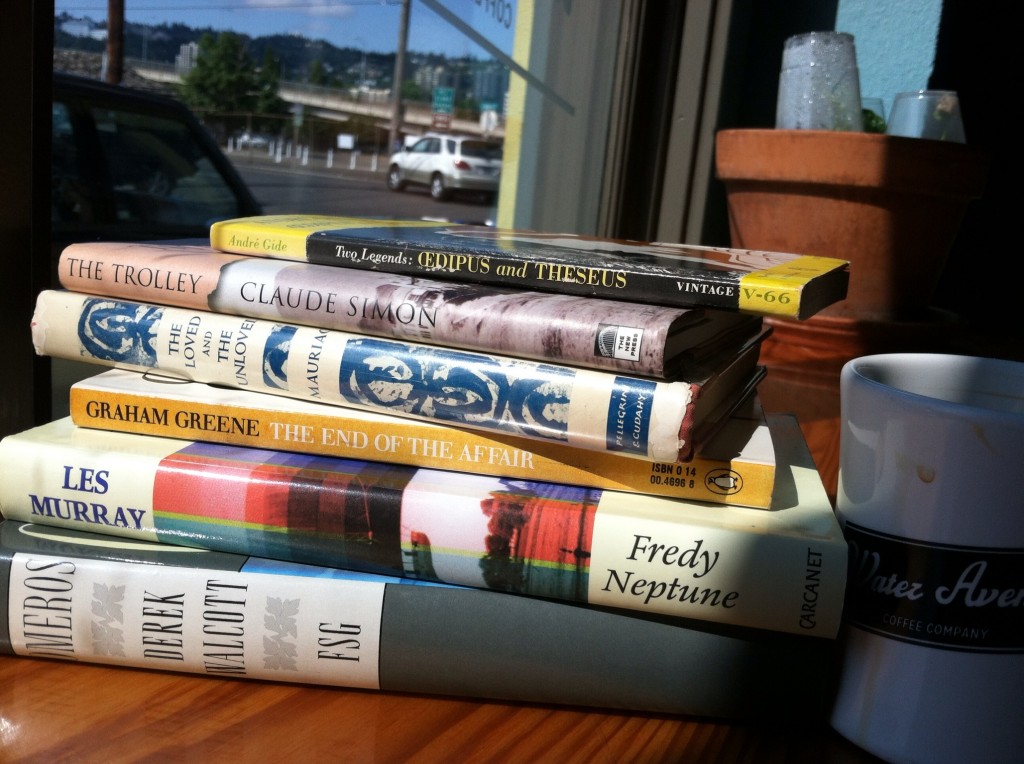A Facebook friend recently posted a picture contrasting a formidably stocked bookshelf with a Kindle. The caption read “This (meaning the books) will always be more impressive to own than this (the Kindle)”. My reptilian brain threw off a little biochemical spark and before I could be even a pretender to consciousness I’d tapped the screen of my iPad to produce that laziest of communications, the Facebook “like”. Not so different, really, from one of Skinner’s pigeons pecking at a bell. My reward, instead of birdseed, was a highly ephemeral self-congratulatory glow. I could imagine myself, for a few seconds now forever lost to me, as having put in my oar on the right side of a minor cultural debate. But, like most such shallow gratifications – depressing, really, in the ease of obtaining – this one appealed to a baser need than I pretended. This piece of Pinterest candy had tapped my endless, often unconscious pursuit of personal impressiveness. In this case, impressiveness of the most illusory kind –arrived at by owning stuff. Books, qua books, had been stripped of meaning.
 This is always so. I own over a thousand books. Every one of them means something to me quite beyond itself as a book. The Illiad, The Interpretation of Dreams, One Hundred Years of Solitude and Fear of Flying each carry a condensation of emotion which has little to do with the battles, the theories, the fabulist flights or crashed societal boundaries contained between it’s covers. Each attends a memory – of how and when it arrived in the collection, where it was purchased, who gave it to me – which in turn presides over a small court of other memories. In the case of most of my books – the ones I’ve read – I remember where I was when I read them, the state, the city, where the airplane was heading, the hotel room. The Agony and the Ecstasy was my reading material to and
This is always so. I own over a thousand books. Every one of them means something to me quite beyond itself as a book. The Illiad, The Interpretation of Dreams, One Hundred Years of Solitude and Fear of Flying each carry a condensation of emotion which has little to do with the battles, the theories, the fabulist flights or crashed societal boundaries contained between it’s covers. Each attends a memory – of how and when it arrived in the collection, where it was purchased, who gave it to me – which in turn presides over a small court of other memories. In the case of most of my books – the ones I’ve read – I remember where I was when I read them, the state, the city, where the airplane was heading, the hotel room. The Agony and the Ecstasy was my reading material to and 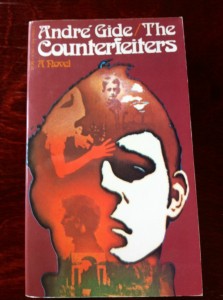 from Florida back in 1995. Between alligators in the Everglades and Hemingway’s three-toed cats in Key West, I was in thrall to Michelangelo’s weathering of hurricane Medici-Savanarola-Pope Julius II to produce his supreme art. Thomas Mann’s Doctor Faustus will always recall to me the improbable little used book shop in Door County, Wisconsin, where I was traveling with Sam, my soon-to-be partner, during Fall break of my Junior year of college. He was wooing me at the time, and the book, with its austere black cover and faded gold lettering on the spine, was a token. André Gide’s The Counterfeiters I will always associate with the little park a block from our house where, over twenty years ago, I sat in dappled shade at the one splintery wooden picnic table, turning its subversive pages, marveling at young Bernard, on the lam from his bourgeois parents, in bed with Olivier and naked save for his short day-shirt.
from Florida back in 1995. Between alligators in the Everglades and Hemingway’s three-toed cats in Key West, I was in thrall to Michelangelo’s weathering of hurricane Medici-Savanarola-Pope Julius II to produce his supreme art. Thomas Mann’s Doctor Faustus will always recall to me the improbable little used book shop in Door County, Wisconsin, where I was traveling with Sam, my soon-to-be partner, during Fall break of my Junior year of college. He was wooing me at the time, and the book, with its austere black cover and faded gold lettering on the spine, was a token. André Gide’s The Counterfeiters I will always associate with the little park a block from our house where, over twenty years ago, I sat in dappled shade at the one splintery wooden picnic table, turning its subversive pages, marveling at young Bernard, on the lam from his bourgeois parents, in bed with Olivier and naked save for his short day-shirt.
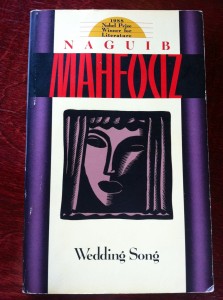 The most valuable memories my books hold, if also the most elusive, are of the person I was when I first read them. Who I hoped to be, who I feared I was, my loves, joys, angers, sexual fantasies, knowledge of people and the world, my spiritual life, all have shifted over time, and my books are like markers – bookmarks – indicating passages of my unwritten life. A couple of years ago I reread Wedding Song, by Naguib Mahfouz, and found it to be a very slight book. But with the merest mental effort I’m back sitting on the bed at a Super 8 in Sioux City, having just survived my Sophomore year at college, finishing that novel for the first time. My grandparents, who had come to fetch me home, had the foresight to reserve separate rooms, so I had space to feel my youthfully ardent sense of loss in private. As they slept on the other side of the wall, oblivious to the rapidly morphing creature they remembered as their grandson, I turned the last page and burst into the most spontaneous tears I can remember having shed. More than having read that book, I felt the book had read me. I don’t expect to ever read it again. Neither will I ever be parted from it.
The most valuable memories my books hold, if also the most elusive, are of the person I was when I first read them. Who I hoped to be, who I feared I was, my loves, joys, angers, sexual fantasies, knowledge of people and the world, my spiritual life, all have shifted over time, and my books are like markers – bookmarks – indicating passages of my unwritten life. A couple of years ago I reread Wedding Song, by Naguib Mahfouz, and found it to be a very slight book. But with the merest mental effort I’m back sitting on the bed at a Super 8 in Sioux City, having just survived my Sophomore year at college, finishing that novel for the first time. My grandparents, who had come to fetch me home, had the foresight to reserve separate rooms, so I had space to feel my youthfully ardent sense of loss in private. As they slept on the other side of the wall, oblivious to the rapidly morphing creature they remembered as their grandson, I turned the last page and burst into the most spontaneous tears I can remember having shed. More than having read that book, I felt the book had read me. I don’t expect to ever read it again. Neither will I ever be parted from it.
The vast majority of my collection I still must clear my throat before calling mine. They are the books that came with Sam. Not a dowry precisely, more like a sprawling, cantankerous, and rather brilliant family. When I first knew him, his copies of the complete works of Sigmund Freud were already laced with yellow highlights, underlines and marginalia. His intellect was a yawning chasm into which fell books on psychoanalysis and metaphysical remedies, R. D. Laing tumbling in with books on flower essences and chakra healing. He swallowed, Python-like, biographies of Stravinsky, Haydn, Freud, the memoirs of Liv Ullman and Elias Cannetti, and huge swaths of twentieth century French literature, not only Sartre, Camus and Proust, but Jean Genet, Jean Anouilh, Colette and Alain Fournier. I remember well several of his reading projects –all of Virginia Woolf, for example, and all of Nabokov. He never got around to all of the great Russian novels, only the dozen or so largest. He read War and Peace while traveling one summer, keeping a mason jar of vodka near by, believing, whimsically, that one should have vodka at hand when reading Tolstoy. His mind floated effortlessly between Shakespeare plays and the poetic little books on relationships by Merle Shain. From Courage, My Love, to Love’s Labors Lost. He nurtured a layman’s passion for neuroscience, acquiring dozens of books on the human brain, many of them graduate textbooks. A few he read cover to cover, but a preponderance were valued as symbols, a kind of externalization of his enthusiasm. All this is to say nothing of his rather obsessive collection of cookbooks.
Since Sam’s death in May of 2013, I’ve tried, in fits and starts, to bring some order to this profligate and proliferated family and it’s occasionally warring factions. The steady accrual of books over so many years, first double-shelved, then stacked, then piled, turned our personal library into the bibliographic equivalent of Rio’s favela. My hope is that someday it can resemble, say, Zurich. But this requires pruning. And pruning is difficult when each book carries a surfeit of meaning. In this case, owning overflowing shelves of books represents, not personal impressiveness, but a person, held against hope of holding, himself once overflowing. There are books in the house I will never read, a great many of which I don’t even want to. But I part with them at a cost.
A month or so after Sam died, my friend Nathan texted me from the used bookstore where he works and which has, itself, a bit of the favela look. “We just got in a children’s book by Mauriac. Are you interested?” The question was rhetorical. François Mauriac was among the first novelists Sam introduced me to, and he has remained one of my great favorites. Until Nathan’s text, I hadn’t been aware that he’d written children’s books. One would not have guessed; in one high-strung, melancholy novel after another spiritually shattered men and women turn from a deeply Catholic idea of grace, opting instead to claw or crawl their way through their terminal sentences in a Bordeaux suffocating under sour grapes. Hardly suggestive of a creative temperament edifying to delicate young minds. I wondered at first if Nathan was being cute; he might as easily have texted “we’ve got this book here on cake decorating by Idi Amin. Interested?”
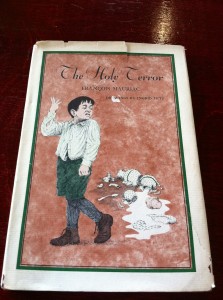 The book turned out to be a strange little jewel called The Holy Terror, about a spoiled little boy who meets his match in a canny governess. P. L. Travers and Christianna Brand traversed similar ground more whimsically in Mary Poppins and Nurse Matilda (Nanny McPhee in the film adaptation), but this one bears Mauriac’s singular spiritual stamp. In all the best books of this ilk the reader quickly deduces that the child’s wretched behavior is symptomatic rather than essential and that the devil is really in the variously failed representatives of adulthood. No different here. Earnest, the eponymous “Terror”, is a dreary little bully with a whole town wrapped around his finger. He elicits sympathy rather than abhorrence because the grown-ups in his life are really children themselves, victims of the small-mindedness endemic to the provincial wealthy. His father and maternal grandmother, for example, have not spoken to each other for over two years except through the intermediary of the old nurse, all because the grandmother once refused to heed the father’s order to cease chattering in deference to his pleasure in eating a meal of ortolans. The nurse’s childishness is that she thinks nothing of this. Earnest’s mother died when he was born, and one can speculate that this blinkered and blithering little group never regained their bearings. So, when Madamoiselle Thibaud arrives, the eighteenth governess in three years, she conspires to free herself of the children she can do nothing about and focus her energy on the one she can.
The book turned out to be a strange little jewel called The Holy Terror, about a spoiled little boy who meets his match in a canny governess. P. L. Travers and Christianna Brand traversed similar ground more whimsically in Mary Poppins and Nurse Matilda (Nanny McPhee in the film adaptation), but this one bears Mauriac’s singular spiritual stamp. In all the best books of this ilk the reader quickly deduces that the child’s wretched behavior is symptomatic rather than essential and that the devil is really in the variously failed representatives of adulthood. No different here. Earnest, the eponymous “Terror”, is a dreary little bully with a whole town wrapped around his finger. He elicits sympathy rather than abhorrence because the grown-ups in his life are really children themselves, victims of the small-mindedness endemic to the provincial wealthy. His father and maternal grandmother, for example, have not spoken to each other for over two years except through the intermediary of the old nurse, all because the grandmother once refused to heed the father’s order to cease chattering in deference to his pleasure in eating a meal of ortolans. The nurse’s childishness is that she thinks nothing of this. Earnest’s mother died when he was born, and one can speculate that this blinkered and blithering little group never regained their bearings. So, when Madamoiselle Thibaud arrives, the eighteenth governess in three years, she conspires to free herself of the children she can do nothing about and focus her energy on the one she can.
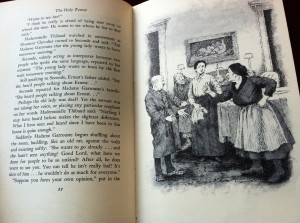 This is where Mauriac’s particular genius starts turning. The townspeople wonder how this young woman could so quickly convince Earnest’s caretakers to go on holiday and leave the boy in her clutches. Her apparent lack of a past indicates to them that she clearly has one, and her eventual success in helping Earnest reform only serves to confirm them in their prejudices. The situation devolves, as it so often does, to a matter of economics. The town butcher reflects, “It does me no good to have the Chevalier house shut up and the Terror starved, when he used to eat enough meat for four because he can’t stand vegetables. There aren’t very many houses in Millasse where they eat meat twice a day. Yes, the more I think about it…. I hadn’t reckoned on being out of pocket. So if she thinks we’ll stand by and make a martyr out of the Terror…. After all, we’re all very fond of him at heart. He’s one of the curiosities of Millasse!”
This is where Mauriac’s particular genius starts turning. The townspeople wonder how this young woman could so quickly convince Earnest’s caretakers to go on holiday and leave the boy in her clutches. Her apparent lack of a past indicates to them that she clearly has one, and her eventual success in helping Earnest reform only serves to confirm them in their prejudices. The situation devolves, as it so often does, to a matter of economics. The town butcher reflects, “It does me no good to have the Chevalier house shut up and the Terror starved, when he used to eat enough meat for four because he can’t stand vegetables. There aren’t very many houses in Millasse where they eat meat twice a day. Yes, the more I think about it…. I hadn’t reckoned on being out of pocket. So if she thinks we’ll stand by and make a martyr out of the Terror…. After all, we’re all very fond of him at heart. He’s one of the curiosities of Millasse!”
One could wish for a bit more fantasy in Mauriac’s morality tale, not necessarily of the magic parasol variety, but playfulness of some kind. Still, he manages to transcend the genre by demonstrating, not just the virtue of personal efficacy, not just adult culpability, but how a society comes to depend on its own malaise.
As I read, I found myself identifying with Madam Thibaud, the outsider coming into town, bewildered by the absurdity of those who would be her betters, but whose native self-possession kicks in, enabling her to see what is needed and to act, even through her own self-doubts. The petty crabbiness of the gossips only increases her aura of compassion and rectitude. Her bookshelves, you could be sure, would resemble Zurich. I have been just like her, I’m sure, though I can’t for the life of me remember when. Which leads me to the conclusion that, once again, my hunger for personal impressiveness, aka vanity, dictated my response.
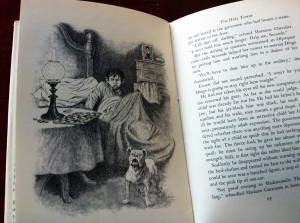 How much more like Earnest, the “Terror”, I felt, at loose ends as to how to behave in a world bereft of Sam, where no one knew how to adequately respond to my needs, because my needs had grown chaotic and contradictory. Like Earnest, I felt out of control, without boundaries, and bullying, certainly to my own psyche. God forbid I would be so to others, who only knew how to do their best for me in the face of my loss, and, in many cases, their own. I was grieving, as it seems clear now that Earnest was. His name itself is a repudiation of the saving irony that so often gets us through our tough stretches, the irony which I longed for but could not find in the loss of Sam, whole and entire.
How much more like Earnest, the “Terror”, I felt, at loose ends as to how to behave in a world bereft of Sam, where no one knew how to adequately respond to my needs, because my needs had grown chaotic and contradictory. Like Earnest, I felt out of control, without boundaries, and bullying, certainly to my own psyche. God forbid I would be so to others, who only knew how to do their best for me in the face of my loss, and, in many cases, their own. I was grieving, as it seems clear now that Earnest was. His name itself is a repudiation of the saving irony that so often gets us through our tough stretches, the irony which I longed for but could not find in the loss of Sam, whole and entire.
One afternoon I took my book to a coffee house. Café Max is a place I go occasionally, but only occasionally, in part because it’s not convenient to where I mostly pursue my life, and partly because Max likes to talk. Max and his partner Yuki have created a space which reaches for Euro-Asian chic. Furniture, not notably uncomfortable, from the various eras of modernism post 1950’s is arranged in clean lines and tasteful groups. Low black bookshelves and end tables are neatly appointed with books and magazines on art and fashion. Coffee is served in simple glass mugs on small lacquered trays complete with miniature cream pitchers and lumps of sugar. His gently over-priced menu includes items featuring arugula, fig preserves and chèvre, and he gets his excellent pastries from a respected local purveyor. Black and white Nouvelle Vague experiments, like Last Year at Marienbad, are occasionally projected silently high on one of the white walls which would likely discolor in protest should typical coffeehouse art be hung. In fact, Max bitterly resents his store being called a coffeehouse. “We’re a café,” he whines, “not a coffeehouse. If you want a coffeehouse, go to Starbucks.”
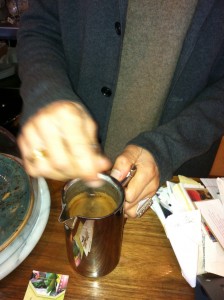 Max is a fiery little extrovert of Puerto Rican decent. Less delicate than worrisomely thin, his dress – expensive casual – belies his fashion designer past. He has taken a liking to me, and during slow stretches will pull up a chair and start talking, mostly about his shop, the often benighted customers, the importance of having eye-candy behind the counter, and the apparently unrelated difficulty in finding baristas who will work as he wants. He has grand visions for Café Max. “I want it to be a nationally known destination for people in search of higher vibrations. Intellectuals. Artists.” He’s asked me to refer a harpist who might come and play on Thursday evenings, and whether I would serve as a Charlie Rose-style interviewer for a series on people doing interesting things in the community, to be held in the café’s basement space. “Interesting, Max. Why not?”
Max is a fiery little extrovert of Puerto Rican decent. Less delicate than worrisomely thin, his dress – expensive casual – belies his fashion designer past. He has taken a liking to me, and during slow stretches will pull up a chair and start talking, mostly about his shop, the often benighted customers, the importance of having eye-candy behind the counter, and the apparently unrelated difficulty in finding baristas who will work as he wants. He has grand visions for Café Max. “I want it to be a nationally known destination for people in search of higher vibrations. Intellectuals. Artists.” He’s asked me to refer a harpist who might come and play on Thursday evenings, and whether I would serve as a Charlie Rose-style interviewer for a series on people doing interesting things in the community, to be held in the café’s basement space. “Interesting, Max. Why not?”
When he saw The Holy Terror on my table, he was overcome with excitement. “This is a very special book!” As he flipped through the pages, cooing over the ink drawings illustrating several of the books moments, I asked him, unbelieving, if he had read it. “Oh, I don’t have to. I can just see this is a very special book. You don’t see this kind of thing. I’ve got to get one for here!” I told him I thought he’d have a hard time finding a copy. “I’ll find one,” he assured me. “Its perfect for Café Max.”
Who was I to contradict? Books, qua books after all –no such thing.

